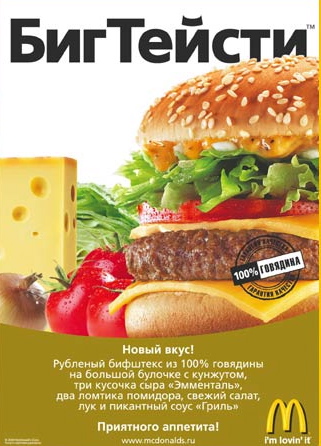
In April 2019, Ksenia Ovchinnikova bought a McDonald’s cheeseburger in her hometown of Omsk, Russia.
It turned out not to be a happy meal.
Ovchinnikova, who is a member of the Russian Orthodox Church, was overwhelmed by guilt. She had made a heartfelt spiritual resolution not to eat meat during Lent, the stretch of 40 days that precedes Easter. But an advertisement for McDonald’s cheeseburgers was too much for her to bear. After 16 consecutive years in which she had kept her Lenten commitments, she found herself irresistibly drawn to the golden arches.
More than two years later, she finally found a way to deal with her lingering guilt. She is currently suing McDonalds for 1,000 rubles (approximately $14) as compensation for “sustained moral damage.”
Ovchinnikova says, “When I saw an advertising banner, I could not help myself. I visited McDonald’s and bought a cheeseburger.” Her lawsuit accuses the fast-food empire of breaking consumer protection laws (they should have known she couldn’t resist temptation) and insulting her religious feelings.
Her lawsuit brings to mind the celebrated one-liner of 1970s stand-up comedian Flip Wilson: “The devil made me do it.”
Or think of the bumper sticker that says, “Lead me not into temptation. I can find it all by myself.”
As we noted last fall when we looked together at the Lord’s Prayer, some people stumble over the last few lines of the model prayer that Jesus taught his disciples. Do we really have to ask God not to set us up for a big fall?
Actually, Matthew 6:13 reflects a Hebraic manner of communication. In ancient Israel, if you wanted to make a positive statement, one option was to negate its opposite. Instead of saying, “Help me do this,” you might make a considerably stronger statement by saying, “Help me not do what I don’t want to do.”
Thus our prayer becomes: “Lord, when I have the desire to disobey you, keep me away from the opportunity. And when I have the opportunity, please kill the desire! May desires and opportunities to break your heart never have a chance to meet.”
In other words, we’re admitting that we cannot stand up under excruciating pressure.
Father, keep us from spirit-crushing trials – both of our own making and those initiated by others. Keep us from falling, since we know that apart from your grace, temptation is likely to overwhelm us.
And when we do fall – something that is bound to happen with some regularity on this side of heaven – Ksenia Ovchinnikovia’s crisis spotlights an important choice we all have to make. We can go one of two ways.
We can say to ourselves, I blew it. This feels awful. Who should Iblame for this disaster? Then we run down the list of all the usual suspects: our parents, our teachers, our pastors, our Congressional representatives, our DNA, and the people who invented cheeseburgers.
Or we can say to ourselves, I blew it. This feels awful. How can I learn from this experience so things turn out differently next time?
The first option is just a dodge. It can lead to a lifelong pattern of evading responsibility.
The second option is the path of humility. It can lead to a lifetime of spiritual growth.
It matters which path we choose.
That’s because our moral integrity is worth a whole lot more than 1,000 rubles.
